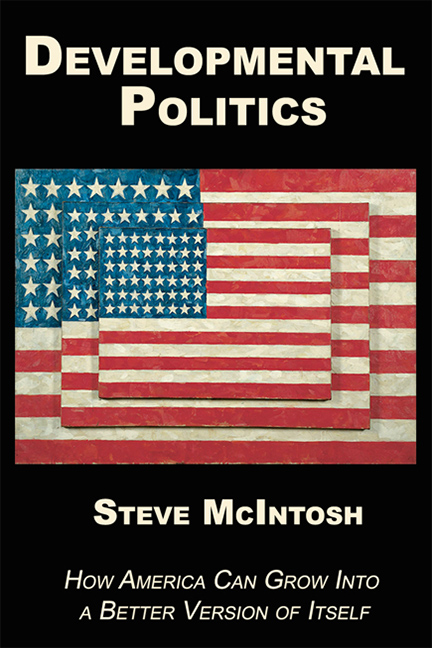American politics are badly broken. Yet to solve the seemingly intractable problem of hyperpolarization, we need to look beyond the gridlocked politics of Washington D.C. In Developmental Politics, Steve McIntosh shows how this growing rift in the fabric of American society is a cultural problem that requires a cultural solution. He offers a pragmatic yet inspiring approach to our national political dilemma through a new politics of culture—one that goes right to the heart of this entrenched, complex issue. McIntosh presents a variety of innovative methods through which citizens and political leaders from across the political spectrum can reach agreement and achieve consensus.
McIntosh’s proposals for overcoming hyperpolarization are founded on an emerging form of “cultural intelligence” that directly addresses the conflicting values underlying our poisoned politics. This new way of seeing leads to an inclusive vision of social progress—a new American Dream—that can help revive our collective sense of common cause and thereby restore the functionality of our democracy. Developmental Politics provides the fresh thinking we need to transcend America’s contemporary political impasse.
"Developmental Politics is essential reading for those who are concerned about the dysfunctional condition of America’s democracy. McIntosh’s application of integral philosophy to the daunting problem of hyperpolarization shows how we can effectively grow out of our gridlocked politics. I highly recommend this groundbreaking and important book."
—John Mackey, CEO of Whole Foods Markets, and Co-Author of Conscious Capitalism
"This is the right book for what’s next in our politics, both nationally and personally. I found McIntosh’s description of the practice of values integration to be instantly indispensable. And I loved his description of how a renaissance of virtue is a tonic for the cynicism of our age. Upon finishing Developmental Politics, it was as if I had been ushered into a more virtuous world. Here, to my surprise, I felt humbled and grateful for our unfolding American story, as wild and wooly as it is. After reading this book I can now see exciting possibilities for our next historical chapters. Also unexpectedly, the book has deepened my appreciation for my own story, and for the people and circumstances of my life."
—Jeff Salzman, Host of the Daily Evolver Podcast, and education entrepreneur
"Is there a world beyond polarization! Indeed there is. In this inspired and brilliant work Steve McIntosh presents a richly conceived integral agenda and evolutionary strategy for the development of culture and consciousness, one that gives substance and reality to the unread vision of the higher dream for this Earth and time.”
— Jean Houston, Ph.D, Chancellor of Meridian University and Author of many books on human development
"Steve McIntosh is an incredibly deep and clear thinker who shows how people with very different worldviews can find a way to communicate, cooperate, and connect. Developmental Politics lays out a step-by-step approach to overcoming the wicked problem of hyper-polarization. This book is just what we need at this troubled time in history."
—Tony Schwartz, bestselling author of The Way We’re Working Isn’t Working and The Power of Full Engagement, and CEO of The Energy Project
"If I could prescribe one book for every Democrat or Progressive candidate and campaign to read (ASAP!), along with every environmental and climate activist and every advocate for racial justice, LGBTQ and gender equality, education reform, and economic equity, it would be Steve McIntosh's Developmental Politics. It's brilliant, well-written, and, I believe, just what the doctor ordered for our ailing body politic."
—Brian D. McLaren, author of The Great Spiritual Migration, and A New Kind of Christianity
"Steve McIntosh’s latest book, Developmental Politics, explores how America can escape political polarization. McIntosh provides an insightful account of the emergence of postmodernism from modernity, showing how culture evolves through the development of values. He persuasively argues that an enlarged understanding of cultural evolution can help us reclaim our collective aspirations for social 'progress'. This important study is a must read! "
—Michael E. Zimmerman, Ph.D., Emeritus Professor of Philosophy, University of Colorado at Boulder, and coauthor of Integral Ecology






